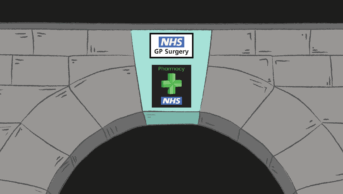
MAG / The Pharmaceutical Journal
Medicines use reviews (MURs) should be redesigned to include ongoing monitoring and regular patient follow-up, giving community pharmacists a much greater role in the management of patients with long-term conditions, according to a long-awaited review of community pharmacy services.
The independent ‘Community pharmacy clinical services review’, which was commissioned in April 2016 by Keith Ridge, England’s chief pharmaceutical officer, and published on 14 December 2016, recommends greater use of repeat dispensing and independent prescribing in community pharmacy. It also calls for improved digital connectivity to allow registered pharmacy professionals full read and write access to patient medical records.
“Except for patients not yet stabilised on their medication, electronic repeat dispensing should become the default for repeat prescribing and its use should be incentivised both for community pharmacies and for GPs,” says the 33-page report.
It adds that the redesigned MUR service should make use of existing transfer of care and referral schemes, but says that if community pharmacy is to provide clinical and cost-effective services in the future, “digital maturity and connectivity should be improved to facilitate effective and confidential communication between registered pharmacy professionals and other members of the healthcare team”.
“This should include the ability for registered pharmacy professionals to see, document and share information with clinical records held by other healthcare professionals and allow the actions, recommendations and rationale for clinical interventions made by registered pharmacy professionals to be visible to the relevant wider healthcare team,” the review says.
The review’s author, Richard Murray, director of policy at the King’s Fund, says enhanced incentives are needed to promote uptake of independent prescribing by community pharmacists. “Ultimately, MURs should evolve into full clinical medication reviews utilising independent prescribing as part of the care pathway,” the report says.
“For these to be safe and effective they would require access to a patient’s full medical record which may not be possible immediately in all situations.”

Source: Courtesy of The King’s Fund
The author of the community pharmacy services review, Richard Murray, director of policy at the King’s Fund, says enhanced incentives are needed to promote uptake of independent prescribing by community pharmacists
Murray’s recommendations also include that NHS England should set out how it intends to deliver on its commitment to establish a locally commissioned minor ailments scheme across England by April 2018. As part of this, it should test models that use patient registration to enhance take-up, building on the experience of the national scheme that exists in Scotland.
The report also recommends that consideration should be given to incorporating smoking cessation services as an element of the national contract.
New models of care should integrate community pharmacy into long-term condition management pathways for residents of care homes, the review says. “This should include pharmacist domiciliary visits to care home patients and full clinical medication review utilising independent pharmacist prescribing.”
Community pharmacists should also be involved in case finding programmes for conditions such as hypertension, the report adds.
As well as poor digital connectivity, Murray highlights “weak relationships between GPs and pharmacy” and complicated commissioning arrangements as factors that inhibit better integration of community pharmacy with other NHS services. This “risks leaving community pharmacy on the outside as new care models develop”, he says.
Murray also suggests that sustainability and transformation plans (STPs) may help ensure community pharmacy is “at the table” as a matter of routine. But because these are at an early stage of development, interim measures are needed to make better use of the sector through existing commissioning routes. Specifically, changes should be made to make local pharmaceutical services contracts easier to use.
The report calls on the Royal Pharmaceutical Society (RPS), Royal College of General Practitioners, the British Medical Association and the Pharmaceutical Services Negotiating Committee (PSNC) to come together “to explore the practical steps that could be taken to unravel professional boundary issues and promote closer working between the professions”.
The review also calls for regulations to be amended to allow registered pharmacy technicians to work under patient group directions to allow better use of skill-mix in delivering clinical pharmacy services.
Sandra Gidley, chair of the RPS English Pharmacy Board, welcomes Murray’s report, saying it “describes a clinical, patient centred role for community pharmacists, completely in line with our own vision for the profession”.

Source: MAG / The Pharmaceutical Journal
Sandra Gidley, chair of the RPS English Pharmacy Board, welcomes Murray’s report, saying it “describes a clinical, patient centred role for community pharmacists, completely in line with our own vision for the profession”
“We welcome the reaffirmation of focus on pharmacists’ read and write access to patient records and other key clinical systems. For community pharmacy, lack of access to critical clinical information remains a practical barrier to greater integration into NHS services that needs to be removed with urgency,” she says.
“For the profession to have confidence in delivery of the recommendations set out in this document, the promised £300m integration fund needs to be translated into a workable implementation plan.The profession needs to hear how and when this fund will be deployed to ensure clinical medication reviews and independent prescribing move from being aspirations to reality.”
However, Gidley also says that while the role of pharmacy technicians in the provision of prescription medicines through patient group directions makes sense for influenza vaccinations, the variability of pharmacy technicians’ training and experience will need to be addressed to avoid any concerns around patient safety.
Rob Darracott, chief executive of Pharmacy Voice, comments: “The positive tone in this document is in stark contrast to the retrograde steps taken by the Department of Health when it chose to reduce the NHS funding for community pharmacy services without a clear plan on how the network would adapt.”

Source: Courtesy of Pharmacy Voice
Rob Darracott, chief executive of Pharmacy Voice, says the “positive tone in this document is in stark contrast to the retrograde steps taken by the Department of Health”
He adds:“It’s great to see NHS England receive a nudge to get the new care models team thinking about integrating community pharmacy, and for local stakeholders to be encouraged to consider how they genuinely involve community pharmacy leaders in STPs.”
Sue Sharpe, chief executive of the Pharmaceutical Services Negotiating Committee, which represents pharmacy contractors, says: “We are ready and keen to work to implement these [proposals] as soon as possible. The events of [2016] have badly dented the confidence of pharmacy contractors, but energy in moving forwards will do a lot to restore it.”
Nitin Sodha, chair of the policy and practice committee at the National Pharmacy Association, which represents independent pharmacies, says: “We hope that NHS England will act with pace to drive forward the service developments described [in the Murray review]. The Department of Health must also be prepared to talk about a sensible level of funding that can sustain this kind of positive development over time.
“Our confidence in NHS England and the Department of Health has been severely dented these past 12 months. We earnestly hope that they take this opportunity to change the bleak scene they have been setting to one which maximises the potential of local pharmacies.”


